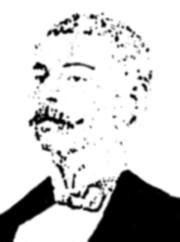Home | Background | Lawyers | Wiley Austin Branton | Contact
 Lewis Jenks Brown was born on January 16, 1858 in Little Rock, Arkansas, the son of Jenks and Caroline Frances (Parker) Brown. He attended public schools in Cincinnati and Little Rock, and took special courses in stenography, typewriting and modern languages in 1878. Brown is listed as a teacher in Little Rock between 1875 and 1887. In 1887, he was president of the Pulaski County Teachers’ Association. He was a clerk in the U.S. Land Office in 1878. Before obtaining his legal education, he was president of the Institute of Science and Mental Improvement and editor of the Arkansas Mansion during 1880-84. Brown also was vice-president and editor of the People’s Herald in 1900.
Lewis Jenks Brown was born on January 16, 1858 in Little Rock, Arkansas, the son of Jenks and Caroline Frances (Parker) Brown. He attended public schools in Cincinnati and Little Rock, and took special courses in stenography, typewriting and modern languages in 1878. Brown is listed as a teacher in Little Rock between 1875 and 1887. In 1887, he was president of the Pulaski County Teachers’ Association. He was a clerk in the U.S. Land Office in 1878. Before obtaining his legal education, he was president of the Institute of Science and Mental Improvement and editor of the Arkansas Mansion during 1880-84. Brown also was vice-president and editor of the People’s Herald in 1900.
Brown attended Howard University Law School, graduating in 1886. Brown was admitted to the practice of law in Arkansas by the circuit court in 1886 and by the state supreme court on May 15, 1887. He was admitted to the U.S. District Court in 1889.
He is listed in the Attorneys section of Little Rock city directories from 1888-89 to 1903-04. Another source notes that he was an attorney for the Interior Department in Washington, D.C. in 1889, and for the Treasury Department in 1890. In 1894, he was listed as the source of information for purchasing burial lots in Little Rock’s Fraternal Cemetery. Brown was reportedly admitted to practice in Missouri and did practice for some time in St. Louis in 1898. Brown was back in Arkansas by 1900, when he was elected the first president of the Wonder State Bar Association, an association of Black lawyers. He served in that role for four terms. Later, Brown acted as secretary of the group.
His directory listing disappears between 1904 and 1908. Brown then reappears from 1908 to 1925, and from 1929 to 1944-45. He was active in Republican politics, serving as delegate to several county conventions and as vice-president of the Arkansas Republican League in 1895. L.J. Brown is listed as co-counsel with Scipio Jones, Robert S. Bowers, and Thomas J. Price in one appellate opinion involving an election dispute within the Grand United Order of Odd Fellows.
Brown was married to Victoria E.O. Caroline in 1892, but was widowed by 1910. They had three children: Gertrude F. Cullins, Walter L. and Caroline F. In the 1920 census, Brown was still single. Brown is listed as owning his own home in both the 1910 and 1920 census reports. He was a member of the Little Rock Commercial League (for whom he also acted as legal counsel), the Masons, the Odd Fellows, and the Ancient Order of Craftsmen. He died at home, 301 East 26th Street, Little Rock, on August 31, 1946, at the age of 88.
Sources: Judith Kilpatrick, “(EXTRA)Ordinary Men: African-American Lawyers and Civil Rights in Arkansas Before 1950,” 53 Ark. Law Rev. 299, 302 n6, 307 n39, 339, 345, 351 n378, 352, 361 n470, 371, 380 n626, 394 (2000); 1910 U.S. Census for Arkansas; 1920 U.S. Census for Arkansas; James T. Haley (ed.), Sparkling Gems of Race Knowledge Worth Knowing (1897); The Colored Lawyers, Arkansas Gazette, 7/31/1901; D.B. Gaines (ed.), Racial Possibilities as Indicated by the Negroes of Arkansas 88 (1898); Who’s Who of the Colored Race 43f (1915); The Baptist Vanguard 6, 7/14/1894 (vol. 12, no. 3); Samuel S. Taylor, Survey of Negroes in Little Rock and North Little Rock 31 (1941);Arkansas State Supreme Court Admissions Records; Little Rock City Directory, 1897-98; African American Biographical Database, Profile, available at http://aabd.chadwyck.com/bbidx/full_rec (last visited 6/9/1999); The Colored Lawyers, Arkansas Gazette, 7/31/1901; Class List, Howard University School of Law, Library Archives; Certificate of Death provided by Tessa Wahlquist